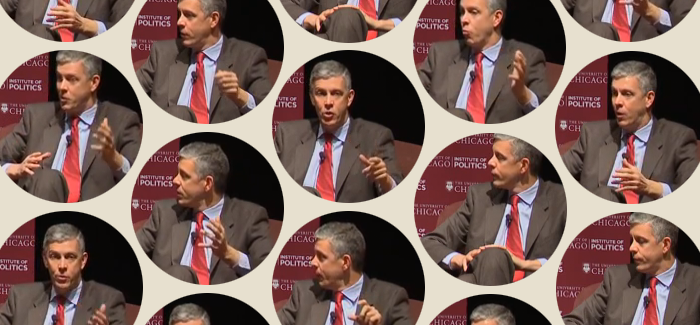
Arne Duncan, U-High’82, at “Implementing the Common Core: The Politics and Promise of Higher Learning Standards.” (University of Chicago News Office)
Many questions, few answers about the Common Core.
If the Institute of Politics’ program “Implementing the Common Core: The Politics and Promise of Higher Learning Standards” had been a play, it would have been a surprisingly riveting production at times. In act 1, US secretary of education and former CPS chief executive officer Arne Duncan, U-High’82, sat down to promote the Common Core education standards with Tim Knowles, the John Dewey director of the University’s Urban Education Institute. In a later scene, Frederick Hess, resident scholar and director of education policy studies at the American Enterprise Institute, joined them to provide an opposing viewpoint.
In act 2, the institute’s executive director Darren Reisberg, former general counsel and deputy superintendent of the Illinois State Board of Education, moderated a panel of Illinois education officials.
There was comedy: Hess took the stage and almost immediately pointed out that Knowles was once named “one of the best-looking men in education.”
There was drama: an African American woman in the audience asked during audience participation, “When are we going to have a panel that doesn’t consist of white males in suits?”
Unfortunately, there were not a lot of answers—not to that question, or to many others.
Opponents of the Common Core are not necessarily against some nationwide educational standards; Hess pointed out that most countries have them. But how, exactly, will the tests that measure these standards work? How will teachers design curriculum to ensure the standards are being met? What about nontested subjects, especially music and art? Why does it have to start next year?
Duncan did have an answer for the last question: “Maybe, in a perfect world, we could wait ten or 15 years. Our kids can’t wait that long.” He advised that the rollout would be bumpy, but that we shouldn’t “let perfect be the enemy of good.”
As for the other questions, that was where the show’s title was revealed to be a bit misleading. Legally, the federal government can set standards but cannot tell states how to achieve them.
“Implementing them is the hard part,” Duncan said.
There were a few answers—or steps toward them—in act 2, but, as Illinois Federation of Teachers president Dan Montgomery pointed out, there are no models for how to proceed. And in any case, Duncan may have made a more important point in act 1: standards, no matter how high or how they’re implemented, are a small part of the education battle. Better support and preparation for teachers and more early childhood education, for starters, would make a bigger difference.
On my way out, I ran into Hess.
“Did you get some clarity?” he asked.
I hadn’t, though as a parent of a Chicago Public Schools first grader, not to mention as a former employee of Duncan’s, I desperately wanted some. But I had been entertained.
Video
Interviews with US secretary of education Arne Duncan and Frederick Hess, director of education policy studies at the American Enterprise Institute, are followed by a panel discussion and audience Q&A.
